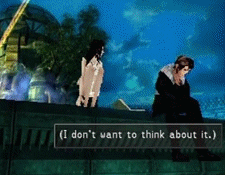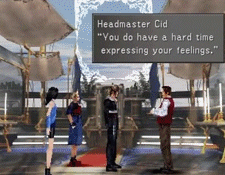|
Inside and Out: Honne and Tatemae
Admittingly, honne and tatemae The creators of Final Fantasy VIII gave us a protagonist who is unusual yet groundbreaking: although he is a man who communicates too infrequently to be playing such a big role, we as players constantly see a side of him that no other character in the game can. Essentially, we are given the opportunity to read his thoughts in the form of semi-transparent dialogue boxes, also known as internal dialogue. These represent the honne, especially since they usually pop up when Squall comes face-to-face with an idea or concept that conflicts with his own personal principles or when he intends to express something, yet can't. Tatemae are then selections of his external dialogue and actions, including all of the excuses he makes up in order to distance himself from others, which essentially make up his front. This contrast between what he truly feels and what others expect him to say stresses the lack of honesty presented towards his peers and comrades, ultimately contributing to varying emotional issues he continuously plummets into. Honne and tatemae In addition to having to conform to standardized social criteria, Squall spends a good chuck of the game struggling to find acceptance among his fellow peers and superiors. His outstanding skill with the Gunblade and expertise in military academia is merely an excuse due to the result of an unresolved issue regarding his past history of rejection (The first person to reject him is Ellone, when she had left him behind in the orphanage. Oddly enough, this history is rather short, yet extraordinarily profound). Perhaps Squall believes that he must always improve himself in order to be good enough for everone else. His self-consciousness, however, doesn't stop there. As a sort of odd self-defense mechanism, Squall purposely tries to cover up that fact that he does indeed care about what others think of him by being cold and unfriendly. He intentionally pushes others away, if only not to get himself hurt at the end. In a moment of weakness, Squall, distraught and somewhat heart-broken, reveals one of his deepest secrets about himself to an uncouncious Rinoa:
This particular moment denotes a shattering between honne and tatemae, where Squall is neither hiding behind something nor struggling to keep a secret. Here, Squall is vocally upfront and honest about who he is and what he's not. He's quite and cold because he's afraid, perhaps more afraid of getting close to others and getting hurt again. Although no one is (consciously) around to hear his confession, you'd have to give him at least some credit for the sincerity. Japanese social stigmas of not fitting into a particular socially-acceptable group or not conforming to universalized standards traverses into the game world in order to be utilized as a tool for development, in turn becoming a concept that is parasitic to Squall's attempt to overcome his inner demons. It takes him several friends and an entire game to make him realize that it is okay to voice your opinions, okay to be open about something you feel the need to emotionally express, and okay to love someone even if you lose them or ends up becoming unrequited. Squall seeks out what everyone tries to find: acceptance. Nothing is stressed more enough than this when trying to find the solution to the base of all of Squall's personal problems.
|
|
|
|
|
 are two concepts that are difficult to explain. In Japanese, honne (本音 ; characters for "original" and "sound") is one's honest feelings and opinions that one wouldn't normally express due to social constraints and etiquette. This is dicated tatemae (建前; characters for "build" and "front"), or actions that appeal to the correct way to behave or respond in respect to societal standards; it is a kind of theatrical front or a public façade. These two concepts are especially important in business and professional situations; people are expected to act a certain way for the sake of pleasing everyone else, even if it is potentially dishonest
are two concepts that are difficult to explain. In Japanese, honne (本音 ; characters for "original" and "sound") is one's honest feelings and opinions that one wouldn't normally express due to social constraints and etiquette. This is dicated tatemae (建前; characters for "build" and "front"), or actions that appeal to the correct way to behave or respond in respect to societal standards; it is a kind of theatrical front or a public façade. These two concepts are especially important in business and professional situations; people are expected to act a certain way for the sake of pleasing everyone else, even if it is potentially dishonest  permeates all aspects of Japanese lifestyle to the point where it can even be constricting. As a game made by a Japanese company, chooses to address issues regarding this particular attitude in which conduct and judgment are heavily dependent on social expectations. Although the world of Final Fantasy VIII is indeed not Japan, certain influential factors such as this come into play when thinking about the presentation of Squall's character. When confronted with a problem, Squall remains passive, choosing not to voice his concerns. His opinions, he deducts, are not essential to the issue at hand; whether he decides what side to denote as good or evil is entirely subjected according to his own personal values. He concludes that doing what society--in the form of military orders--expects of him is the right decision, regardless of whether or not he thinks otherwise. In other cases, he tries to suppress his own personal feelings, needs, and aspirations. During the attack on Balamb Garden, Squall wished to protect his home for several valid reasons, such as personal attachment (we know this because of those "thought boxes"), but in the end, he defends that his, "feelings have nothing to do with it"
permeates all aspects of Japanese lifestyle to the point where it can even be constricting. As a game made by a Japanese company, chooses to address issues regarding this particular attitude in which conduct and judgment are heavily dependent on social expectations. Although the world of Final Fantasy VIII is indeed not Japan, certain influential factors such as this come into play when thinking about the presentation of Squall's character. When confronted with a problem, Squall remains passive, choosing not to voice his concerns. His opinions, he deducts, are not essential to the issue at hand; whether he decides what side to denote as good or evil is entirely subjected according to his own personal values. He concludes that doing what society--in the form of military orders--expects of him is the right decision, regardless of whether or not he thinks otherwise. In other cases, he tries to suppress his own personal feelings, needs, and aspirations. During the attack on Balamb Garden, Squall wished to protect his home for several valid reasons, such as personal attachment (we know this because of those "thought boxes"), but in the end, he defends that his, "feelings have nothing to do with it"
